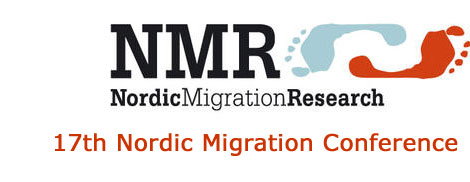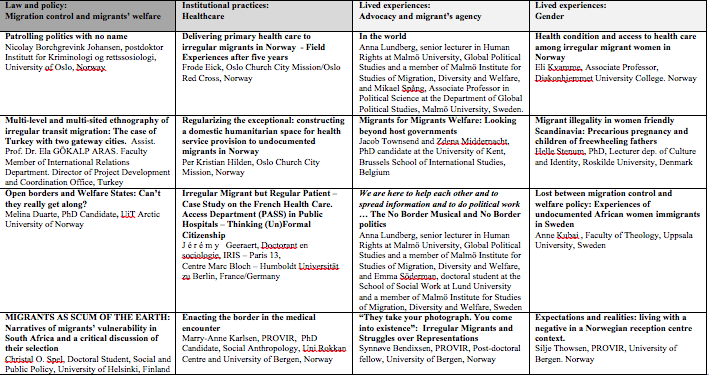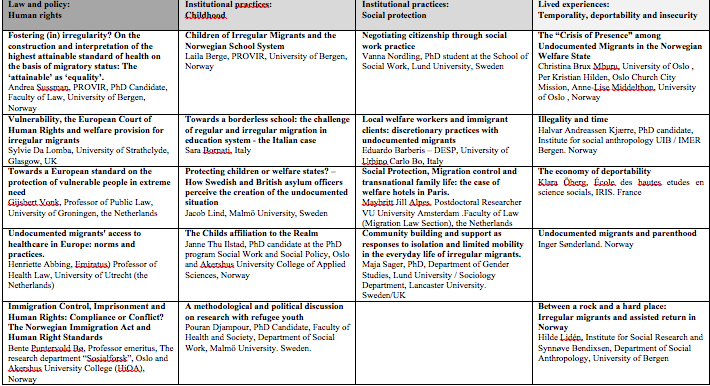Note: Venue has changed: Anthropology, not Rokkansenteret.
OUT-reach! – Kommunikasjon av «frivillig retur» til irregulære migranter i Norge.
Hvordan kan en stat på best mulig måte gi informasjon om ”frivillig retur” til irregulære migranter? Bør ikke-statlige organisasjoner delta i denne oppgaven, eller vil det å påta seg slike oppgaver undergrave andre funksjoner disse organisasjonene har? Hvordan kommuniseres frivillig retur i dag, og finnes det alternative bedre måter å gjøre dette på?
”Frivillig retur” har fått sterk kritikk av forskere, migranter og organisasjoner for at deltagelse i slike program ofte mangler nettopp det frivillige elementet. Innen forskningen har ‘frivillig retur’ blitt sett som tett knyttet opp til tvangsretur, deportasjon og institusjoner som opprettholder statens grenser. I et slikt perspektiv blir tilbud om «frivillig retur” gjerne sett på som ikke mer enn en mildere variant av tvangsretur og i beste fall en form for obligatorisk retur. «Frivillig retur» er altså tett knyttet opp mot mye av elementer som ikke-statlige organisasjoner ofte har stilt seg kritiske til. Hva er da rasjonale som ligger bak at ulike ikke-statlige hjelpe- og advocacyorganisasjoner eller ulike diaspora- og migrantorganisasjoner tar på seg ansvaret for å formidle ”frivillig retur”? Og på den annen side, er overnevnte årsaker den eneste grunnen til at enkelte organisasjoner ikke velger å gi slik informasjon?
Basert på forskning tilknyttet en kommende UDI rapport i regi av Uni Rokkansenteret vedrørende informasjon om ”frivillig retur” til irregulære migranter utenfor mottak i Norge utforsker Bendixen og Kjærre det etiske og moralske grenselandet som er konteksten for informasjon om frivillig retur, hvordan ulike aktører stiller seg til slikt informasjonsarbeid, og til slutt hvordan de irregulære migrantene selv ser på denne informasjonen i lys av deres livssituasjon i Norge.
Synnøve Kristine Nepstad Bendixsen er postdoktor ved sosial antropologisk institutt i Bergen, og forsker på Uni Rokkansenteret hvor hun er tilknyttet prosjektet Provision of Welfare to Irregular Migrants (PROVIR). Hun har tidligere studert på London Scool of Economics og har en PhD fra Humboldt universitetet (Berlin) og Ecole des Hautes Etudes en Sciences Sociales (Paris). Hennes forskningsfelt er religiøsitetsutforming blant unge Muslimer i Berlin, samt flere forskningsprosjekter innen tema returmigrasjon og irregulær migrasjon, og hun har flere publikasjoner innen disse feltene.
Halvar Andreassen Kjærre er PhD stipendiat ved IMER/Sosialantropologisk institutt i Bergen og har publisert artikler og deltatt på flere forskningsprosjekter innen temaet irregulær/illegalisert migrasjon. Han er også tilknyttet prosjektet PROVIR og jobber for tiden med sin PhD om mobilitet blant irregulære migranter i Schengen/Europa. Tidligere prosjekter har vært ved NTNU samfunnsforskning i Trondheim, Sosiologisk institutt i Oslo, og han jobber nå sammen med Synnøve på overnevnt prosjekt ved Uni Rokkansenteret.
IMER Abroad: PROVIR Seminar – Precarious migrants and access to welfare: Between policy, law and practice
This workshop will discuss the legal and experienced dilemmas found in the encounter between migrants living in a legally precarious situation and the welfare state in which they reside. Participants will present ongoing empirically based research on migrants’ access to welfare in policy, law and practice in various European countries. They will also discuss the particular position of youth and children in vulnerable situations. The program is available here.
Lessons from the past: framing post-war immigration in Germany by historical analogies
In many West European countries, the experience of mass immigration after 1945 was perceived as something basically new and unprecedented. In the lengthy process of coming to terms with the new situation and of developing a self-understanding as countries of immigration and of ethnic pluralism, historical arguments often played an important role. By placing present-day immigration into a historical perspective, by constructing narratives of continuity (and discontinuity) and not least by presenting persuasive historical analogies, historians (and others) introduced arguments that informed the debates of the day and allowed the experiences of immigration and multi-ethnicity to be integrated into (national) narratives of identity. The German case is particularly interesting in this respect, since a tradition of tolerance and successful integration had to be invented in spite of the fresh memories of the Nazi-past that were witness to the contrary.
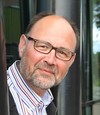 Christhard Hoffmann (born 1952 in Luneburg, Germany) is a German historian and professor of modern European history at the University of Bergen. In the period 2007-2013 he was Head of the Department of Archaeology, History, Cultural Studies and Religion.
Christhard Hoffmann (born 1952 in Luneburg, Germany) is a German historian and professor of modern European history at the University of Bergen. In the period 2007-2013 he was Head of the Department of Archaeology, History, Cultural Studies and Religion.
Hoffmann defended in 1986 his doctoral dissertation on German Antiquity historians’ representation of Jews and Judaism in the 19th and 20th centuries [1] at the Technische Universität Berlin, where he also worked as a researcher for many years. From 1994 to 1998 he was a visiting professor at the University of California, Berkeley, and since 1998 he has worked at the University of Bergen.
Hoffmann has an extensive list of publications in the fields of German-Jewish history and cultural history, history of anti-Semitism and migration history.
Communicating Migration Seminar series
The IMER seminar series for 2014 will cover how migration and ethnic relations are communicated in every-day encounters, in mass and social media, in politics and in teaching at the universities. Has the way people talk about migration and migrants in different social contexts changed over time, and in which ways has it changed? How does migration theory and research fit in with other topics and theories in the social sciences, and how do results from migration research inform public debate and policy development?
Communicating migration will be discussed from various angles in our seminar series on international migration and ethnic relations during spring and autumn 2014. We welcome papers that touch upon this broad theme from different angles. Historical analyses of change over time in regard to politics and public debate, research foci and disciplinary concerns are specifically welcomed.
COMMUNICATING MIGRATION SEMINARS: ESPEN HELGESEN – “Your dad is looking for you” – Children’s perspectives on state intervention in immigrant families in Norway
Several recent international news stories have described state-initiated forced separation of children and parents in Norway, illustrating how local decisions in the Child Welfare Service can have widespread ramifications outside the families involved. In this paper I draw on ethnographic fieldwork among immigrant families in Kristiansand, Norway, to show how a group of children responded when one of their friends suddenly disappeared. The secrecy surrounding the inner workings of the Child Welfare Service led the children to frame the incident as a “kidnapping”, and several children expressed fear that they, too, would be separated from their families. Frustrated with the lack of an explanation of what had happened to their friend, the children turned to online worlds, where they could express their fears and concerns by sharing artwork with friends outside the adult gaze.
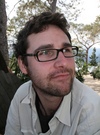 Espen Helgesen is a PhD candidate at the Department of Social Anthropology, University of Bergen, currently finishing his thesis on technology-mediated sociality and self-formation among children of immigrants in Norway.
Espen Helgesen is a PhD candidate at the Department of Social Anthropology, University of Bergen, currently finishing his thesis on technology-mediated sociality and self-formation among children of immigrants in Norway.
Communicating Migration Seminar Series IMER Bergen spring and autumn 2014
The IMER seminar series for 2014 will cover how migration and ethnic relations are communicated in every-day encounters, in mass and social media, in politics and in teaching at the universities. Has the way people talk about migration and migrants in different social contexts changed over time, and in which ways has it changed? How does migration theory and research fit in with other topics and theories in the social sciences, and how do results from migration research inform public debate and policy development? Communicating migration will be discussed from various angles in our seminar series on international migration and ethnic relations during spring and autumn 2014. We welcome papers that touch upon this broad theme from different angles. Historical analyses of change over time in regard to politics and public debate, research foci and disciplinary concerns are specifically welcomed. The seminar series will end with a two-day conference in October/November 2014.
BSRS 2014 Governance to meet Global Development Challenges
Welcome to BSRS2014!
The theme for BSRS2014 is Governance to meet Global Development Challenges. The event will take place from June 23rd to July 4th 2014 at the University of Bergen. Please find information about the courses, application form and other activities at the menu to your right side.
One of the courses is and IMER/SKOK PhD course.
Read more at:
http://www.uib.no/rs/bsrs/programme/bsrs-2014-governance-to-meet-global-development-challenges
The 17th Nordic Migration Conference is organized by a steering committee consisting of researchers from Aalborg University, Copenhagen University, SFI – the Danish National Centre for Social Research and Roskilde University Center, as well as board members from Nordic Migration Research.Confirmed keynote speakers:
– Professor Thomas Hylland Eriksen, Oslo University, Norway.
– Professor Nicolas de Genova, King’s College, London, UK
– Economist Philippe Legrain, London School of Economics, UK
– Professor Claudia Strauss, Pitzner College, USA.Time and place
The conference will be held in Denmark – 13th – 15th August – 2014, and hosted by Centre for Advanced Migration Studies at the University of Copenhagen, on Amager, close to Copenhagen Airport.- Read more at:
Nando Sigona – The politics of refugee voices: representations, narratives and memories
This paper reflects on existing debates surrounding the politics of ‘refugee voices’ by examining the relationship between representations, narratives, and memories of refugees’ experiences. Drawing on literature framed by post-structuralist and critical theories, the chapter problematizes assumptions regarding the existence of ‘a refugee voice’ on the one hand, and the extent to which academic and policy discourses often fail to listen to or to hear such voices on the other. It does so by identifying different configurations of the production and consumption of emic narratives of forced migration and displacement (that is, produced by forced migrants themselves), exploring the factors shaping these narratives and the embedded power relations that permeate them. In particular, the paper explores the practices and spaces which refugees enact and embody to contest the processes which lead to the silencing and marginalization of their narratives and experiences. To do so, the chapter is divided in three main sections which in turn address different yet interlinked manifestations of the ‘refugee voice’.
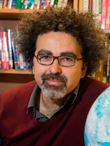 Nando Sigona is a lecturer and Birmingham Fellow at the University of Birmingham. He is also Research Associate at the Centre on Migration, Policy and Society (COMPAS) and Refugee Studies Centre, both at the University of Oxford. His research interests include: statelessness, diasporas and the state; Romani politics and anti-Gypsyism; ‘illegality’ and the everyday experiences of undocumented migrant children and young people; and governance and governmentality of forced migration in the EU.
Nando Sigona is a lecturer and Birmingham Fellow at the University of Birmingham. He is also Research Associate at the Centre on Migration, Policy and Society (COMPAS) and Refugee Studies Centre, both at the University of Oxford. His research interests include: statelessness, diasporas and the state; Romani politics and anti-Gypsyism; ‘illegality’ and the everyday experiences of undocumented migrant children and young people; and governance and governmentality of forced migration in the EU.
His work has appeared in a range of international academic journals, including Sociology, Social Anthropology, Journal of Ethnic and Migration Studies, Identities and Ethnic and Racial Studies. He is one of the editors of the Oxford Handbook on Refugee and Forced Migration Studies (Oxford University Press 2014), Associate Editor of Migration Studies, a refereed journal by Oxford University Press, and co-author of Sans Papiers. The social and economic lives of undocumented migrants (Pluto Press, 2014).
IMER Seminar:
Elaine Chase and Jenny Allsopp: The ‘tactics’ of time and status: Young people subject to immigration control making the transition to ‘adulthood’ in the UK
Young people who arrive in the UK from outside Europe without a parent or legal guardian are institutionally categorised according to a range of possible legal statuses and usually afforded time-limited Leave to Remain in the UK. These categorisations are associated with specific welfare entitlements which tend to diminish over time and become particularly uncertain as young people transition into ‘adulthood’. Situated within a broader research programme examining the link between migration, ‘wellbeing’ and ‘futures’, this paper examines the multiple transitions imposed on young people subject to immigration control as they approach the age of 18 and beyond, (from child to ‘adult’, from being accorded a temporary residence permit to more permanent leave to remain or from legality to ‘illegality’) and the implications for their access to various dimensions of welfare provision. The paper shows how different components of the ‘state’ have time limitations at their disposal to control access to welfare and state support according to chronological age. From young people’s perspectives, such ‘tactics’ fundamentally control their trajectories and future prospects unless they can formulate strategies of their own to counter such tactics.
Read more about Elaine Chase here
Read more about Jenny Allsopp here
Rolf Halse: Muslim characters in the television serial 24
The presentation will centre on my PhD thesis – a thesis that I according to plans will defend 7 November this year at the University of Bergen. The thesis presents an examination of the US television serial 24’s representation of Muslim characters, and it explores to what extent the perception of these characters can be determined by the cultural and ethnic belonging of the audience. The main reason for choosing to study 24 exclusively is that after 9/11 the serial played a central role in the public debate about whether Muslims are being stereotyped in US television entertainment. Hence, I will discuss whether the critics of 24 have a valid point with regards to the show’s portrayal of negative stereotypes. I will also assess to what extent the serial’s effort to introduce Muslim counter-stereotypes proved to be an adequate response to the criticism.
 Rolf Halse is a Ph.D. Candidate at the Department of Information Science and Media Studies, at the University of Bergen. His research interests lie in popular culture, media audiences and the politics of representation. Halse has published his work in renowned media studies journals such as Critical Studies in Television: the International Journal of TV Studies, Journal of Arab and Muslim Media Research and Nordicom Review.
Rolf Halse is a Ph.D. Candidate at the Department of Information Science and Media Studies, at the University of Bergen. His research interests lie in popular culture, media audiences and the politics of representation. Halse has published his work in renowned media studies journals such as Critical Studies in Television: the International Journal of TV Studies, Journal of Arab and Muslim Media Research and Nordicom Review.
Contact: Rolf Halse, Department of Information Science and Media Studies, University of Bergen, Box 7802, 5020, Bergen, Norway. E-mail: rolfhalse@infomedia.uib.no
PROVIR closing conference: Registration deadline 01.10.2014:
Conference registration deadline is 1st of October. Send abstract and registration details to Marry-Anne.Karlsen@uni.noMore information about the PROVIR-project is available at http://rokkan.uni.no/sites/provir/ To register and pay registration fee, please use the following link: https://provir.hoopla.no/sales/#1609368930/
Closing conference PROVIR: “Exceptional welfare: Dilemmas in/of irregular migration”
How do states respond to the physical presence and needs of people it officially has excluded? To what extent do international human rights provide protection? How does migration control and welfare policy affect irregular migrants’ experiences and subjectivities?Physically present, but legally excluded, irregular migrants’ present societies with particular dilemmas relating to both sovereignty and human suffering. European countries increasingly involve welfare services in migration control, either by restricting access, or by using welfare services to detect/expose irregular migrants. This raises important questions concerning not only how migrants’ legal status influences their capacity to access services, but also the practical and ethical implications for service providers. Furthermore, it challenges the extent to which human rights actually limit the exclusionary powers of states and as such whether human rights are viable outside the confines of citizenship.
Provision of Welfare to Irregular Migrants (PROVIR) will be organizing its closing conference at the University of Bergen, 19th – 21th of November 2014. As an interdisciplinary project, the PROVIR research group and its international partners have combined a legal and social science approach to the provision of welfare to ‘irregular migrants’ in Norway, and comparatively in Europe, looking particularly at health care and education. The aim of the project has been to investigate the complex relationship between law, institutional practice, and migrants’ lived experience.
The closing conference aims to bring together researchers from various disciplines who are interested in the interplay between migration control and welfare policy. At the conference, findings from the PROVIR-project will be presented by the research team. In addition to presentations by key note speakers, the PROVIR research team also welcomes papers to be presented at workshops. The topics adressed will be:
- Irregular migrants’ legal situation regarding access to welfare provisions, either in national or international law.
- Institutional practices and responses by service providers.
- Migrants’ experiences, agency and embodiment.
PROGRAM:
Wednesday 19th of November Venue: Det Akademiske Kvarter
18.00-19.30: Letter to the king Film by Hisham Zaman
Letter to the King portrays five people on a day trip from a refugee camp to Oslo, a welcome change in an otherwise monotonous life. But we soon realize that each and every one of them has an agenda for their trip. All five will make decisive choices on this day, as they discover happiness, humiliation, love or fulfill a long-awaited revenge. The five stories are tied together by a letter, written by eighty-three year old Mirza. Mirza wants to hand over the letter to the King personally.
19.30-21.00: Mediating irregular migration
The phenomenon of irregular migration is inextricably linked to its forms of mediation. Researchers, artists, authors, journalists and others contribute to the proliferation of images of the lives, and deaths, of those who migrate without proper authorization from the state. While stereotypical accounts of victims/criminals proliferate in mainstream media – (counter) representations that challenge such stereotyping also exist. The speakers in this panel discussion have all participated in producing and/or analysing images of irregular migration. Taking as their point of departure the film “Letter to the King”, they will discuss the poetics and politics of mediating irregular migration. What (im)possibilities does such mediation offer for current border struggles?
Plenary panel discussion with:
Hisham Zaman, Director (To be confirmed)
Shahram Khosravi, Associate Professor of Social Anthropology, University of Stockholm
Synnøve N. Bendixsen, Post-doctoral fellow PROVIR and Department of Social Anthropology, University of Bergen
Film and panel discussion organized in cooperation with Studentersamfunnet i Bergen (http://samfunnet.sib.no/)
Thursday 20th of November Venue: Faculty of Law, Magnus Lagabøtes plass 1, University of Bergen
09.30-10.00: Tea, coffee and registrations
10.00-10.15: Welcome address
10.15-11.45: Precarious inclusion: Provision of welfare to irregular migrants in Norway
Presentation of PROVIR research findings by
Christine M. Jacobsen, Karl Harald Søvig, Synnøve Bendixsen, Andrea Sussman and Marry-Anne Karlsen
11.45-12.00: Coffee break
12.00-13.00: Care Beyond Welfare?
Key note lecture by Miriam Ticktin, Associate Professor of Anthropology, The New School for Social Research and Eugene Lang College (US)
13.00-14.00: Lunch
14.00-16.00: Workshops
16.00-16.15: Coffee break
16.15-17.15: Wrongs, Rights and Regularization
Key note lecture by Linda Bosniak, Distinguished Professor of Law, Rutgers School of Law–Camden (US)
19.00: Conference dinner
Nøsteboden
Friday 21st of November
Venue: Faculty of Law, Magnus Lagabøtes plass 1, University of Bergen
09.15-10.15: Limiting Health Care as a Tool of Immigration Policy: Ethnographic Insights into Deservingness and Responses by Civil Society
Key note lecture by Heide Castañeda, Associate Professor and Graduate Director, Department of Anthropology, University of South Florida (US)
10.15-10.30: Coffee break
10.30-13.00: Workshops
13.00-14.00: Lunch
14.00-16.00: Excepted, excluded or precariously included? Dilemmas in/of irregular migration Roundtable discussion by PROVIR research team and international partners:
Bridget Anderson, Professor of Migration and Citizenship and Deputy Director of Centre on Migration, Policy and Society (COMPAS), University of Oxford (UK)
Milena Chimienti, Professor, University of Applied Science Western Switzerland – Social Work, Haute Ecole Fribourgeoise de Travail Social (HETS) (Switzerland)
Henriette Abbing, (Emiratus) Professor of Health Law, University of Utrecht (the Netherlands)
Christine M. Jacobsen, Professor, PROVIR project leader and Director of Center for Women’s and Gender Research (SKOK), University of Bergen (Norway)
Karl Harald Søvig, Professor, Faculty of Law, University of Bergen (Norway)
Workshop Porgram:
Download workshop program here

